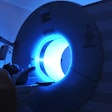It is a bumpy ride, to be sure, but virtual colonoscopy is making steady progress toward the Holy Grail of any new medical test in the U.S.: Medicare reimbursement. The issuance of temporary CPT codes for virtual colonoscopy earlier this year is a major step forward on a political path that has been as tortuous as any colon.
The new Category III CPT codes are welcome news for the procedure, according to Robert Bloomfield, vice president of VC vendor E-Z-EM and director of the nascent Coalition for CTC (CT colonography or virtual colonoscopy), an organization formed to promote the development of virtual colonoscopy as a screening option for colon cancer.
"This sets everything in motion," he told AuntMinnie.com earlier this month. "Now that (virtual colonoscopy) has its own codes, even though they’re temporary, it means that everybody in the country will be reporting it in a uniform way, which hasn’t been the case up until now. Every doctor has been coding it differently, and it’s been hard to gather any data on what’s going on."
The temporary codes are 0066T for screening virtual colonoscopy, i.e., screening CTC, and 0067T for diagnostic virtual colonoscopy, i.e., diagnostic CTC. The American Medical Association issues Category III codes for the purpose of gathering data on emerging and investigational procedures, and the new VC codes will take effect in July.
The AMA emphasizes that the codes do not represent an endorsement of virtual colonoscopy -- or a guarantee that permanent codes will be issued when the evaluation period is over. But Bloomfield sees them as an auspicious beginning.
"Coding is first, then comes coverage, then comes reimbursement,” he said. "You can’t have reimbursement unless you have a code or coverage criteria…. As the (exam) data comes into the Medicare system, people will be analyzing it and seeing who is getting this procedure. Hopefully, even non-Medicare patients will be using the codes, so that CMS will be getting the same codes as Aetna and Oxford (Health), and then they’ll come up with the coverage criteria."
Then, when CMS sees the facilities and institutions that are generating most of these codes, it can go back for more detailed information in order to develop reimbursement guidelines, and determine groups of patients (over 50 years of age, family history of cancer, etc.) who are eligible for the exam, he said.
The long and winding road
Last October, in a talk at the 2003 International Symposium on Virtual Colonoscopy, Bloomfield discussed the promise and the potholes on the road to virtual colonoscopy reimbursement in the U.S. It is a bumpy path, paved with good intentions. For example, Congress has made several efforts to legislate payment for screening exams, so far unsuccessfully.
To understand Congress, he said, "it’s important to see where they’re coming from. "They’re not physicians, most of them, they’re not scientists. As you know, Congress is mostly full of lawyers. So they get their information from lots of sources, not scientific and medical journals, but from the Web, and they get it from people who send them information for lobbying or other reasons."
There are a number of bills in Congress that provide for screening reimbursement, but except for forays in and out of committee, they haven’t gone far, he said. There is, for example, Senate bill SB 1740 and corresponding House bill HR 1422, dubbed the "Colon Cancer Screen for Life Act of 2003."
“Which sounds great until you realize that it was originally called the “Colon Cancer Screen for Life Act of 1999," he said.
The Screen for Life bills are structured as amendments to the Social Security Act, and grew out of perceived failures in a 1997 law that provided for limited Medicare coverage of colonoscopy for screening purposes. A 1999 General Accounting Office review of claims found just 3.8% of Medicare patients had had a colonoscopy that year -- just 1% higher than in 1995, before Medicare began covering screenings.
"Congress said 'We have to do something -- it’s not working,'" Bloomberg said. "And as Congress tends to do, they put the pressure on someone else, and said in this (current) legislation that they want CMS to go out and encourage more effective screening. Then CMS said 'We can’t do anything unless you fund us.' So we have this back and forth battle that goes on continually in the government -- as I said, this bill has been floundering around in Congress for awhile."
Another bill, the National Cancer Act of 2003 (SB 1101, HR 2471), may actually be more important, Bloomberg said. Sponsored by Sen. Diane Feinstein and co-sponsored by Sens. Kerry, Clinton, and Kennedy, the legislation would require insurance companies to pay for cancer screening, making it a routine part of healthcare. (Similar requirements for payors are included in a 2004 bill that targets colon cancer specifically. Dubbed the "Eliminate Colorectal Cancer Act of 2004," SB 2265 and HR 4097 have been referred to committee.)
"Their hearts are in the right place," Bloomberg said, "but whether Congress can legislate for private companies to do these kinds of things is arguable. As you might imagine, this has been fought extremely hard by the insurance companies."
It is also important to remember that CMS is an insurance company in its own right, he said. "They’re the world’s biggest insurance company, and they’re like any other insurance company. They’d rather not pay if they don’t have to. And if they have to pay, they’d rather pay as little as they have to. Their worst nightmare is that this thing works well and everybody goes and gets a (virtual colonoscopy). Because we just can’t afford it -- if 75 million (Americans over 50 years of age) or even half of those people get it, there’s no money to pay for it."
Many insurers deny reimbursement of virtual colonoscopy screening under any circumstances. An example that gained notice recently, Bloomfield said, was the case of a 63-year-old man on anticoagulant and antiplatelet medications. The gastroenterologist said he could not perform a colonoscopy unless the patient was willing to stop taking the medications for 10 days before and after the exam.
But the primary physician didn’t like the idea of stopping the medication, Bloomfield said, and so referred the patient for a virtual exam. But the insurer said VC was "not medically necessary" and refused to reimburse it, noting that the procedure remains investigational.
The insurance company’s decision was appealed, and the primary care physician cited the specific reasons why he recommended virtual colonoscopy. But the insurer found a consultant to respond the second time. The consultant again cited the investigational nature of VC, and added that practitioners sometimes had difficulties differentiating polyp from stool -- notwithstanding the fact that the patient’s virtual exam had been performed with fecal tagging.
The consultant noted that the patient could have had a barium enema instead. "And one could argue that maybe they’re right, if they could find one of those few that are left that can do good barium enemas," Bloomfield said.
But the bottom line is that private insurers don’t know much about virtual colonoscopy, and for that matter, Congress and CMS also struggle to define it, Bloomfield said. Worse, what they do read about virtual colonoscopy can be confounding. Some procedures are performed with barium fecal tagging, some without. Some radiologists use IV contrast in some patients, some don’t. Sometimes there is a reduced prep and sometimes not. Some use low-residue meals, some all-liquid diets. Insufflation is either automated or it isn’t, using either air or CO2.
Some are using CAD, which may eventually reduce interpretation time, but in that case CMS would want to avoid a reimbursement structure that pays doctors for extra interpretation time they no longer need to spend. As for extracolonic findings, CMS would have to pay for every potential pathology that required follow-up.
"And again this raises the level of confusion in their mind," he said. "What is virtual colonoscopy? CMS is not saying there should be one standard, not even two, maybe three or even four, but surely not 20 different ways to do this procedure," he said.
In panel discussions following Bloomfield's talk at the symposium, radiologists defended the use of different methods of performing virtual colonoscopy as necessary both for advancement of the technique, and for tailoring the exam to specific patients groups such as the elderly, the asymptomatic, or those with suspected colorectal disease.
Uneven results
There are concerns, too, about wide variations in study results, Bloomfield said. For example, a 2003 Mayo Clinic VC study yielded an average sensitivity of just 46% per-polyp for lesions 10 mm and larger, with a range of 32% to 73%. (Gastroenterology, August 2003, Vol. 125:2, pp. 311-319).
"We all know that behind this paper are some old cases using equipment and systems that go back a number of years, but again, the people in Congress don’t have the kind of background and detail to understand that," Bloomfield said. "They see the numbers that don’t look good, and more importantly they see Mayo Clinic…. (Congress) looks to the major medical centers for guidance and advice on what’s right and what’s good. This doesn’t help."
What of the groundbreaking Navy virtual colonoscopy study, which captivated radiologists and the evening news anchors when it beat conventional colonoscopy? The results showed high sensitivity and specificity (93.9% sensitivity for polyps 8 mm and larger) in a large group of average-risk patients. The study, first presented at the October symposium, was later published in the New England Journal of Medicine (December 4, 2003, Vol. 349:23, pp. 2191-2200.)
But exceptionally good data raises questions too, Bloomfield said. "What’s the reason for that good data? Is it the way they cleanse the colon? What impact did that have? A double (bisacodyl laxative) dose, did that improve it significantly? Tagging, did that improve the procedure? And those places that didn’t do double dose and tagging, are they going to have different results? These are the kinds of things they worry about. CMS, a key player in this whole process, has had a number of concerns and issues," he said. "'Not ready for prime time' was the expression they’ve used. Now they would probably say its closer."
One must also consider the gastroenterology community, a powerful force in Washington that has never been a big fan of radiology’s virtual exam. Indeed, "The Facts About Virtual Colonoscopy" (PDF file), a "misleading" patient education pamphlet based on "half truths" about VC, is still on the American College of Gastroenterology's Web site, Bloomfield said.
Still, last November the ACG congratulated the authors of the 2003 Navy study on their success with virtual, and there are other indications of smoother relations ahead. According to Bloomfield, closer ties between radiologists and the gastroenterology community will be an important part of virtual colonoscopy’s eventual success.
The American College of Radiology will be another key player in terms of guidelines, testing, and accreditation. And the Congressional Budget Office has a crucial role in terms of rendering a verdict on the costs associated with any new colorectal cancer screening program. Perhaps the CBO will find that the risk of perforation in conventional colonoscopy makes VC a more attractive option than endoscopy, Bloomfield said.
Still, the best strategy with Congress may not be to push for full reimbursement of virtual colonoscopy for anyone over 50. Perhaps a better approach would be to advocate reimbursement for particular groups of patients, such as those who have failed colonoscopy, or, as in the earlier example, patients on anticoagulants who cannot have the conventional exam.
"Get some kind of legislation, just for those special groups," he said. "Get our foot in the door. And while those people are being taken care of, build a database to support (VC) for everybody. That will probably be the strategy that we move forward with. It’s less scary to the people in government, and for the private payors as well."
By Eric BarnesAuntMinnie.com staff writer
April 30, 2004
Related Reading
Billing for VC: even the reimbursement is virtual, November 19, 2004
Politics matters in the real world of virtual colonoscopy, November 5, 2003
Toward a CRC screening strategy: gastroenterologists take the stage, June 3, 2002
Copyright © 2004 AuntMinnie.com




















